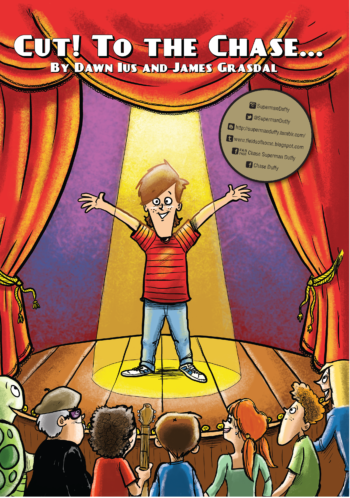
Kindergarten Learning Objectives for “Cut! To the Chase”
Jump to Subject

Drama
Topic: Creative Expression
General Learning Objective
The child explores self-expression through creative thought and through language, art, movement, music and drama.
Specific Learning Objectives
- Explores and expresses ideas, perceptions, feelings and
thoughts in a variety of forms; e.g., art, music, drama and
movement
- Uses imagination creatively in dramatic play; e.g., story,
puppets, role-play and mime
- Explores familiar materials in new ways
Topic: Creative Expression
General Learning Objective
The child becomes aware of various forms of expression.
Specific Learning Objectives
- Becomes aware of why and how ideas are communicated
through art, music, movement and drama

English Language Arts
General Learning Objective
1. Students will listen, speak, read, write, view and represent to explore thoughts, ideas, feelings and experiences.
Specific Learning Objectives
1.1 Discover and explore
Express ideas and develop understanding
- Share personal experiences prompted by oral, print and other media texts
- Talk about ideas, experiences and familiar events
Experiment with language and forms
- Talk and represent to explore, express and share stories, ideas and experiences
1.2 Clarify and Extend
Consider the ideas of others
- Listen to experiences and feelings shared by others
Combine Ideas
- Connect related ideas and information
Extent Understanding
- Express interest in new ideas and experiences
General Learning Objective
2. Students will listen, speak, read, write, view and represent to comprehend and respond personally and critically to oral, print and other media texts.
Specific Learning Objectives
2.1 Use Strategies and Cues
Use prior knowledge
- Connect oral language with print and pictures
- Understand that stories, information and personal experiences can be recorded in pictures and print and can be listened to, read or viewed
- Expect print and pictures to have meaning and to be related to each other in print and other media texts
Use comprehension strategies
- Ask questions and make comments during listening and reading activities
- Recall events and characters in familiar stories read aloud by others
Use phonics and structural analysis
- Identify and generate rhyming words in oral language
2.2 Respond to Text
Experience various texts
- Participate in shared listening, reading and viewing experiences, using oral, print and other media texts from a variety of cultural traditions and genres, such as picture books, fairy tales, rhymes, stories, photographs, illustrations and video programs
- Listen and view attentively
Construct meaning from texts
- Relate aspects of oral, print and other media texts to personal feelings and experiences
- Talk about and represent the actions of characters portrayed in oral, print and other media texts
- Talk about experiences similar or related to those in oral, print and other media texts
Appreciate the artistry of texts
- Experiment with sounds, words, word patterns, rhymes and rhythms
2.3 Understand Forms, Elements and Techniques
Understand forms and genres
- Experience a variety of oral, print and other media texts
Understand techniques and elements
- Develop a sense of story through reading, listening and viewing experiences
- Identify the main characters in a variety of oral, print and other media texts
General Learning Objective
3. Students will listen, speak, read, write, view and represent to manage ideas and information.
Specific Learning Objectives
3.1 Plan and Focus
Focus Attention
- Attend to oral, print and other media texts on topics of interest
- Make statements about topics under discussion
3.3 Organize, Record and Evaluate
Evaluate information
- Share new learnings with others
3.4 Share and Review
Share ideas and information
- Share ideas and information about topics of interest
Review research process
- Share information-gathering experiences
General Learning Objective
4. Students will listen, speak, read, write, view and represent to enhance the clarity and artistry of communication.
Specific Learning Objectives
4.1 Enhance and Improve
Expand knowledge of language
- Experiment with rhymes and rhythms of language to learn new words
4.3 Present and Share
Demonstrate attentive listening and viewing
- Make comments that relate to the topic being discussed
General Learning Objective
5. Students will listen, speak, read, write, view and represent to respect, support and collaborate with others.
Specific Learning Objectives
5.1 Respect Others and Strengthen Community
Relate texts to culture
- Explore oral, print and other media texts from various communities

Health
Topic: Personal Health
General Learning Objective
Wellness Choices
Students will make responsible and informed choices to maintain health and to promote safety for self and others.
Specific Learning Objectives
W–K.1
- Describe ways, and make choices, to be physically active daily
W–K.5
- Recognize that nutritious foods are needed for growth and to feel good/have energy; e.g., nutritious snacks
Topic: Life Roles and Career Development
General Learning Objective
Life Learning Choices
Students will use resources effectively to manage and explore life roles and career opportunities and challenges
Specific Learning Objectives
L–K.6
- Demonstrate awareness of the ways in which people take care of responsibilities in the home and school

Social Studies
Topic: K.1 I Am Unique
General Learning Objective
Students will demonstrate an understanding and appreciation of the multiple social, physical, cultural and
linguistic factors that contribute to an individual’s unique identity.
Specific Learning Objectives
following questions for inquiry:
Topic: K.2 I Belong
General Learning Objective
Students will demonstrate an understanding and appreciation of the characteristics and interests that unite
members of communities and groups.
Specific Learning Objectives
exploring and reflecting upon the following questions:
upon the following questions for inquiry:
Topic: Dimensions of Thinking
General Learning Objective
Skills and Processes
Specific Learning Objectives